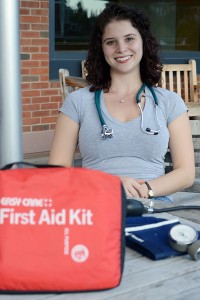Neuroscience Major Fraiman ’15 Encourages Students to Become WesEMTs
In this issue of The Wesleyan Connection, we speak with Aviv Fraiman from the Class of 2015.

Q: Aviv, what are you majoring in and why?
A: I’m majoring in neuroscience and behavior because I find the brain absolutely fascinating. When I think of the brain, I’m reminded of a puzzle, except instead of the pieces being cardboard shapes, they’re an interwoven tangle of yarn. All the different pathways – it’s really chaotic, but there’s such beauty in its design. Neuroscience is a field where there’s an endless amount to learn and that really excites me.
Q: You’re currently President of the WesEMT organization. What made you decided to become an Emergency Medical Technician?
A: Before coming to Wesleyan, I was a Lifeguard certified in CPR, AED (automated external defibrillator) and basic wound management and care. Additionally I had experience volunteering in hospitals, shadowing physicians and overseeing surgeries. However, I was not an Emergency Medical Technician.
My freshman year, I heard that Wesleyan was hosting an EMT certification course and decided to go to the information session. The course instructor, Emily Masters, was so eloquent in her explanation of what an EMT was: Someone who is calm in chaos, and able to think critically in difficult situations. But moreover, she demonstrated that an EMT must be compassionate, caring, responsible and have leadership skills. Before I even went to the information session, I knew I wanted to save lives, but I left the information session knowing that by taking that course, I would get closer to that goal. So, I took the class. I think it was one of the best decisions I’ve made at Wesleyan.
Q: When is the training, and for how long?
A: WesEMT hosts an EMT certification course annually. The course starts mid-September and ends in late-April/early-May. This year there are about 40 students enrolled. Last Sunday was our first official class. We went over CPR with a video demonstration and the students practiced on manikins – it went really well!
Q: Who should consider becoming a WesEMT? What are the benefits of having this training?
A: Everyone should consider becoming a WesEMT! No matter what your goals are in life, the skills that you are taught in this course are applicable. WesEMT training teaches you how to manage life-threatening injuries and medical conditions. But in addition to learning how to assess patients, this course instills you with confidence, leadership and critical thinking skills, compassion and professionalism.
Q: What are your other extracurricular activities?
A: In addition to my role within WesEMT, I worked as an EMT for Cromwell Fire Department and now as a probationary EMT for the Haddam Volunteer Ambulance Service. I co-founded Wesleyan United with Israel, an advocacy and awareness group, and I’m president of WeShare, a group that hosts interactive cooking sessions for senior citizens with Alzheimer’s Disease/dementia. It’s a good thing that my physical juggling ability isn’t a template for my academic juggling behavior. Which is to say that if you have three ripe apples, it would be a bad idea to hand them to me. Although I’m aware I can’t juggle, I still will try, and they will fall and bruise. In whatever I’m part of, I can’t help but give it my all, which is perhaps why I haven’t given up on trying to get those apples from hitting the ground.
Q: Why did you choose Wesleyan?
A: First off, I knew I wanted to go to college in the Northeast, so that’s where I started looking for schools that interested me. When I visited schools, they all seemed pretty much the same but the feeling I had when I visited Wesleyan was different. Honestly, Wesleyan scared me. It seemed like every student on campus was doing something so interesting, something they were really passionate about. The opportunities to find yourself, or mold yourself into whomever you wanted to be seemed endless.
I always wanted to be a doctor, and the thought that I might change my mind if I went to Wesleyan really frightened me. But then I thought, if I really do want to be a doctor, Wesleyan is the place to prove it.
What initially drew me in was Wesleyan’s course flexibility, high-caliber science departments and research facilities, student body size, small-town atmosphere, and the beautiful architecture of the buildings. But what finalized the decision was my determination to test my dream of becoming a doctor in an environment where there were so many other paths I could take.
Q: What would you say are the benefits to attending a liberal arts college before attending medical school?
A: In general, I believe that a liberal arts education instills you with the skills to analyze an issue from many different perspectives. Applying that skill towards medicine is definitely an advantage. But more importantly, after medical school, it’s a long path straight through internship, residency and fellowship programs. I don’t think there’s time to learn about ancient Greek history or to take a sign language course. Experiencing those other realms now when you have time not only makes you a well-rounded student, but also in the future will make you a well-rounded physician.
Q: Where are you from and what’s something else we should know about you?
A: I was born in New Jersey, and that will always be my home. But almost eight years ago my family moved to Florida. Oh, and anyone who knows me can tell you that my favorite animal is a duck. Guaranteed.
For more information or to get involved with WesEMT, e-mail Aviv at afraiman@wesleyan.edu.

